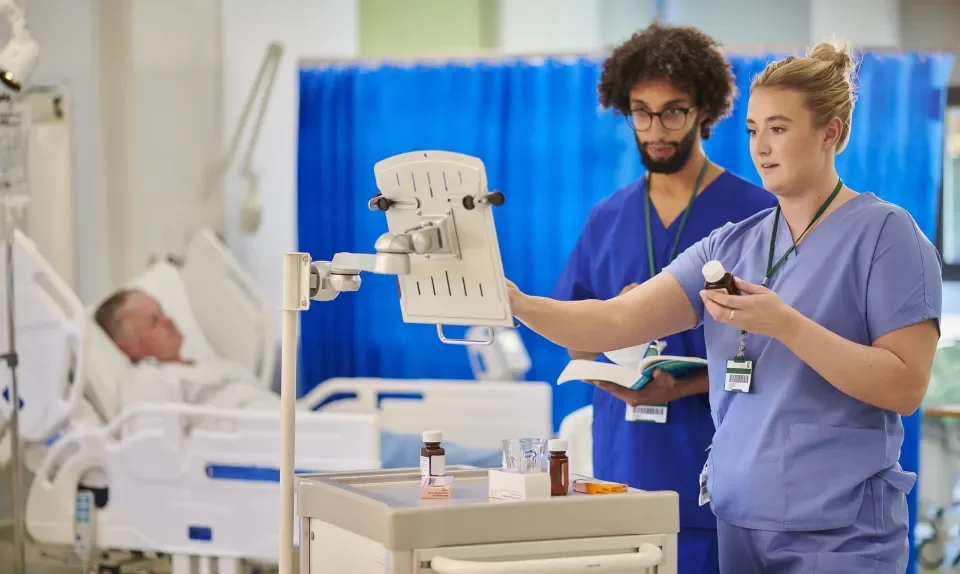Overview
Nurses are problem-solvers with a natural tendency to care about how people feel and usually have qualities such as resilience, empathy, reliability, integrity and good communication skills are leading qualities in the nursing field.
Nurses play a critical role in society, helping people to achieve, maintain or regain the best possible health while also offering patients support and dignity. During this course, you’ll develop deep nursing knowledge, along with skills such as critical thinking, reflective practice, research principles and problem-based learning. You’ll learn how to ensure the care you deliver as a compassionate and committed nurse is current and evidence-based.
Extensive practical experience
DCU offers this four-and-a-half-year course in partnership with health service providers from both the public and private healthcare sectors. You’ll complete several placements in each year of the programme, across adult and children’s hospitals as well as community facilities, along with a 36-week internship in years four and five. Also, the Erasmus+ exchange programme is open for application to all 2nd year nursing students and takes place in semester 1 of 3rd year. Find out more about this placement exchange on our International Placement webpage.
Once you graduate, you can apply to register as both a Children’s and a General nurse to the Nursing & Midwifery Board of Ireland (NMBI). You’ll be qualified to work as a nurse in hospitals, the community, schools, and nursing homes in Ireland or overseas, with work opportunities in the UK, Australia, Canada and the US in particular. You can also choose to go on to postgraduate study.
Why DCU
DCU People

I was inspired to pursue a career in nursing after spending time in hospital while I was recovering from pneumonia.
Read more about Niamh O’Toole
Careers & Further Options
Careers
Upon graduation, your internationally recognised degree will qualify you to work as a Nurse both at home and abroad.
You’ll also be eligible for professional registration with Bord Altranais agus Cnáimhseachais na hÉireann (Nursing and Midwifery Board of Ireland (NMBI).
You’ll find work opportunities in the community, schools, general practice, occupational health, and traditional hospitals and care facilities. Career pathways also exist in clinical practice, management, education and research.
- Education
- General Nurse
- Research
DCU graduates are highly sought after by employers. Our Graduates work in environments ranging from large multinationals to SMEs, family businesses and start-ups across every sector.
DCU Careers Service has a number of learning and development initiatives in place for our students, giving them the skills they need for a successful career path.
Entry Requirements
In addition to the general entry requirements for admission to the university the following entry requirements apply
Minimum of O6 or H7 in Mathematics and minimum of O6 or H7 in one of Physics, Chemistry, Biology, Physics with Chemistry or Agricultural Science
In addition to the general entry requirements for admission to the university the following entry requirements apply
GCE A Level D or GCE AS Level D or GCSE C Mathematics and GCE A Level D or GCE AS Level D or GCSE C in one of Physics, Chemistry , Biology, Physics with Chemistry or Agricultural Science
Please visit our Admissions webpage for details on course requirements or how to apply to DCU.
Please visit our QQI FET webpage for details on DCU courses, open days, campus tours or school visits.
To apply to DCU, please visit www.cao.ie.
No entry path
International candidates are expected to have educational qualifications of a standard equivalent to those outlined above. In addition, where such candidates are non-native speakers of the English language they must satisfy the university of their competency in the English language. Click here for further information on international applications.
Course Structure
Year 1 (All Nursing Disciplines)
- Personal and Professional Development
- Core Nursing Skills
- Psychology
- Sociology of Health and Illness
- Caring and Communication in Nursing
- Anatomy and Physiology
- Clinical Practice Placements
Year 1 Stream Specialisms
- General Nursing
- Understanding Intellectual Disability
- Mental Health Nursing
- Children’s Nursing
Children’s and General Nursing Year 2
- Principles of Caring for Specific Patients
- Caring for the Adult
- Children’s Nursing
Year 2 (All Nursing Disciplines)
- Personal and Professional Development
- Clinical Pharmacology for Nursing Practice
- Altered Bodily Processes
- Research and Nursing Practice
- Clinical Practice Placements
Children’s and General Nursing Year 2
- Principles of Caring for Specific Patients
- Caring for the Adult
- Children’s Nursing
Year 3 (All Nursing Streams)
- Ethics in Nursing
- Research and Nursing Practice
- Clinical Practice Placement
Children’s and General Nursing Year 3
- Care of the Child with Ongoing Healthcare Needs
- General Nursing
- Children’s Nursing
- Clinical Practice Placement
Year 4 (All Nursing Streams)
- Nursing Informatics, Management and Leadership
- Health Promotion in a Multicultural Context
- Research Enquiry
- Clinical Practice Placement
Children’s and General Nursing Year 4
- Caring for a Child with Multisystem Dysfunction
- Provision of Care for Children
- General Nursing
- Ethics in Nursing
Children’s and General Nursing Year 5
- Clinical Practice Placement
Fees and Funding
Fees
How To Apply
Applicants presenting EU/FETAC Level 5 examinations: Apply through the Central Applications Office (CAO) by 1st February or 1st May
Applicants presenting qualifications from outside of the EU can apply directly to DCU by July 1st via our online application portal here.
All candidates are required to apply through CAO. Mature Entry is for those that are 23 years of age or older by 1st January in the year of entry, applicants are also required to sit a test. Candidates are assessed by the Nursing Careers Centre (NCC) of An Bord Altranais agus Cnáimhseachais na hÉireann (Nursing and Midwifery Board of Ireland, NMBI).
Mature entry route is based on applying for a nursing course via www.cao.ie by 1st February. Late applications (up to 1st May) may be considered on grounds of mature years, where an applicant has registered and taken the NMBI written assessment in the current year. Applicants can also avail of the change of mind facility on CAO up to 1st July. Although it is possible to make a late application to mature nursing, it is not possible to apply late for other mature entry routes. All other mature entry routes should be applied for by 1st February, to ensure they can engage in any mature assessments.
For details please visit: www.nursingcareers.ie or email: careersinformation@NMBI.ie to request a copy of their nursing and careers booklet.
No entry path
Please see Application Procedures or E-mail ugadmissions@dcu.ie.
Candidates submitting EU examination results are required to apply through the CAO at www.cao.ie.
Candidates submitting non-EU examination results are required to apply directly here.
Life On Campus
At DCU, our students can expect a unique campus experience. We are known for our excellent teaching and learning facilities, our active clubs and societies, and our great social and sporting facilities. All this makes DCU an exciting place to be.
DCU has three academic campuses; Glasnevin, St. Patrick’s and All Hallows (both in Drumcondra), all close to Dublin City centre.
They can be reached by public transport, Dublin Bus and Bus Éireann, with our Drumcondra campuses a ten minute walk from Drumcondra Train Station. Glasnevin is a 20 minute walk from St Patrick’s and All Hallows. They are also linked by Dublin Bus.
Each campus has a library (O’Reilly, Cregan and Woodlock Hall), study spaces, restaurants, and on-campus residencies. There are sports facilities on Glasnevin and St. Patrick’s, and there is a dedicated sports campus, St Claire’s, located near Glasnevin on the Ballymun Road.
DCU’s 19,000 students have access to exceptional teaching and learning facilities across our three academic campuses.
These include modern learning theatres, research centres, a new media and TV studio, radio/podcast studios, computer suites and advanced labs in the areas of Languages, Engineering, Physics, Chemistry and Biotechnology, as well as a Sports Performance centre and a training hospital ward. In 2021, we opened our first virtual reality ‘Leadership Lab’, which is located in our Business School.
We continue to improve and update our facilities. For example, construction of a new world-class STEM facility is underway on the Glasnevin campus. With capacity for an extra 3,000 STEM students, this facility will advance DCU’s international reputation for excellence in science and health, computing and engineering disciplines.
Studying in DCU isn’t just about course work. The university is rich in student life and activities.
There are more than 140 clubs and societies for students in DCU, with ‘Clubs & Socs’ days taking place on both the Glasnevin and Drumcondra campuses at the start of the academic year. They span everything from rugby to rock climbing, anime to jazz.
For many students, sport is an important part of the DCU experience. DCU’s Sports Complex boasts a 25 metre swimming pool, fitness centre gym, all-weather pitches and squash courts, as well as soccer, GAA and rugby pitches. DCU Dóchas Éireann, the university’s GAA club, is the largest third level Gaelic Games club in the country. Meanwhile, DCU Athletics has been Ireland’s highest achieving university club for many years. And DCU has dozens of other clubs to get involved in, from Archery to Weightlifting.
The Glasnevin campus is home to our purpose built, state-of-the-art student centre, The U, which serves the needs of a rapidly growing student body. Here, you will find the Student Leadership and Lifeskills Centre, performing arts and cultural spaces for students and the wider community, and the Entrepreneurship and Innovation Hub. Also located on our Glasnevin campus is The Helix, our renowned performing arts centre.
On our St Patrick’s campus, we have the Java Student Hub, a vibrant, warm and welcoming space where students can meet for coffee, play music, use the projector to watch events, or just relax. The walls of the Java Hub were designed based on the cultural history of St Patrick’s Campus, including the special references to the notable sporting history and history of the arts.
We have a number of academic, professional and social supports for students.
Student Advice & Learning Skills Centre - Offers a wide range of supports and services to students and advice
The Writing Centre - drop-in writing workshops for students through the academic year
Maths Learning Centre - provides maths support for students of all ability levels with maths modules
Student Learning - facilitate the transition from passive to active learning for students at DCU, by teaching study skills, nurturing critical thinking and building student confidence.
Careers work with students to help them on their professional journey into graduate employment.
Our student support team offers a comprehensive support programme, helping students make that all important transition into university life and focusing on building confidence and skills which are key to success at third level.

DCU Glasnevin Campus
FAQs
What is the ratio of practical experience to lecture-based learning?
Approve 50:50
When and where do I complete my hospital placements?
Each year you will have the opportunity to practise nursing in the clinical setting in your linked healthcare service. These are called ‘practice placements’. During Years 3 and 4 longer periods are spent on these practice placements. In the last six months of the nursing programme, students do an internship (paid) in the healthcare setting.
Is there an Erasmus as part of the Nursing course?
Yes, Erasmus opportunities are available, further information is available on the School of Nursing, Psychotherapy and Community Health International Placement webpage.
Is DCU all one campus?
DCU is a multi campus university - the Glasnevin, St Patrick's and All Hallows campuses. The St Patrick's campus is where the Education courses are taught and some of the subjects from the BA Joint Honours degree. There is a 20-25 minute walk between the campuses but there are buses and bikes available to go between them also.
Click here to see maps of all of our campuses
If I'm studying on the St Patrick's campus, can I use the library and sports centre on the Glasnevin campus?
Yes, all facilities such as sports and accommodation are open for all DCU students to avail of.
Are there libraries in DCU and if they have wifi and work stations?
We have a brand new state of the art four floor library on our St. Patrick's Campus which complements the existing library on the Glasnevin campus. There is free wifi, work stations as well as desktop computers.
Does DCU provide accommodation?
DCU does have on-campus accommodation for undergraduate and postgraduate students, and you can find out more and apply via the Accommodation Office webpage.









